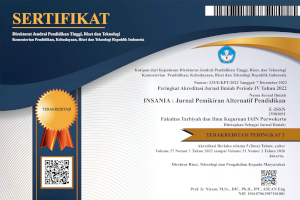WELL BEGUN IS HALF DONE: KEEPING THE SPARKS FLYING DURING ENGLISH LESSONS
DOI:
https://doi.org/10.24090/insania.v24i2.3184Keywords:
lesson opening, begin, engage, classroom, English lessonAbstract
Opening plays a very crucial period in the course of a lesson. Just like other expressions to illustrate the energy it gives, the analogies could be “Love at the first sightâ€, or, “First impression (of you) is so exciting, the rest is up to youâ€. Lessons opening, when it is made beneficial to the students, serves as a fire trigger, providing them with strong power at the start, and sustains “eternal flame†till the end of the lesson. This article argues the rationale behind it and presents some ways of creating such lessons opening in the context of English language teaching.Downloads
References
Hancock, M. 2008. Pronunciation Games. Cambridge: Cambridge University Press.
Howard, A. 2010. Is There Such a Thing as a Typical Language Lesson? Classroom Discourse. Vol. 1, No. 1.
Maulida, R. D. 2016. Frontloading Strategy to Improve EFL Junior High School Students’ Descriptive Text Reading Skill. International Seminar on English Language Teaching (ISELT 2016). Sultan Ageng Tirtayasa University.
Richards, J. C. and Lockhart, C. 1996. Reflective Teaching in Second Language Classrooms. Cambridge: Cambridge University Press.
Suwartono, S. 2016. Teacher’s Creativity in ELT. International Seminar on English Language Teaching (ISELT 2016). Sultan Ageng Tirtayasa University.
Ur, P. and Wright, A. 1992. Five-Minutes Activities: A Resource Book of Short Activities. Cambridge: Cambridge University Press.
Downloads
Published
How to Cite
Issue
Section
License
Authors who publish with this journal agree to the following terms:
Authors retain copyright and grant the journal right of first publication with the work simultaneously licensed under a Creative CommonsAttribution-ShareAlike License that allows others to share the work with an acknowledgment of the work's authorship and initial publication in this journal.
Authors are able to enter into separate, additional contractual arrangements for the non-exclusive distribution of the journal's published version of the work (e.g., post it to an institutional repository or publish it in a book), with an acknowledgment of its initial publication in this journal.
Authors are permitted and encouraged to post their work online (e.g., in institutional repositories or on their website) prior to and during the submission process, as it can lead to productive exchanges, as well as earlier and greater citation of published work (See The Effect of Open Access).








